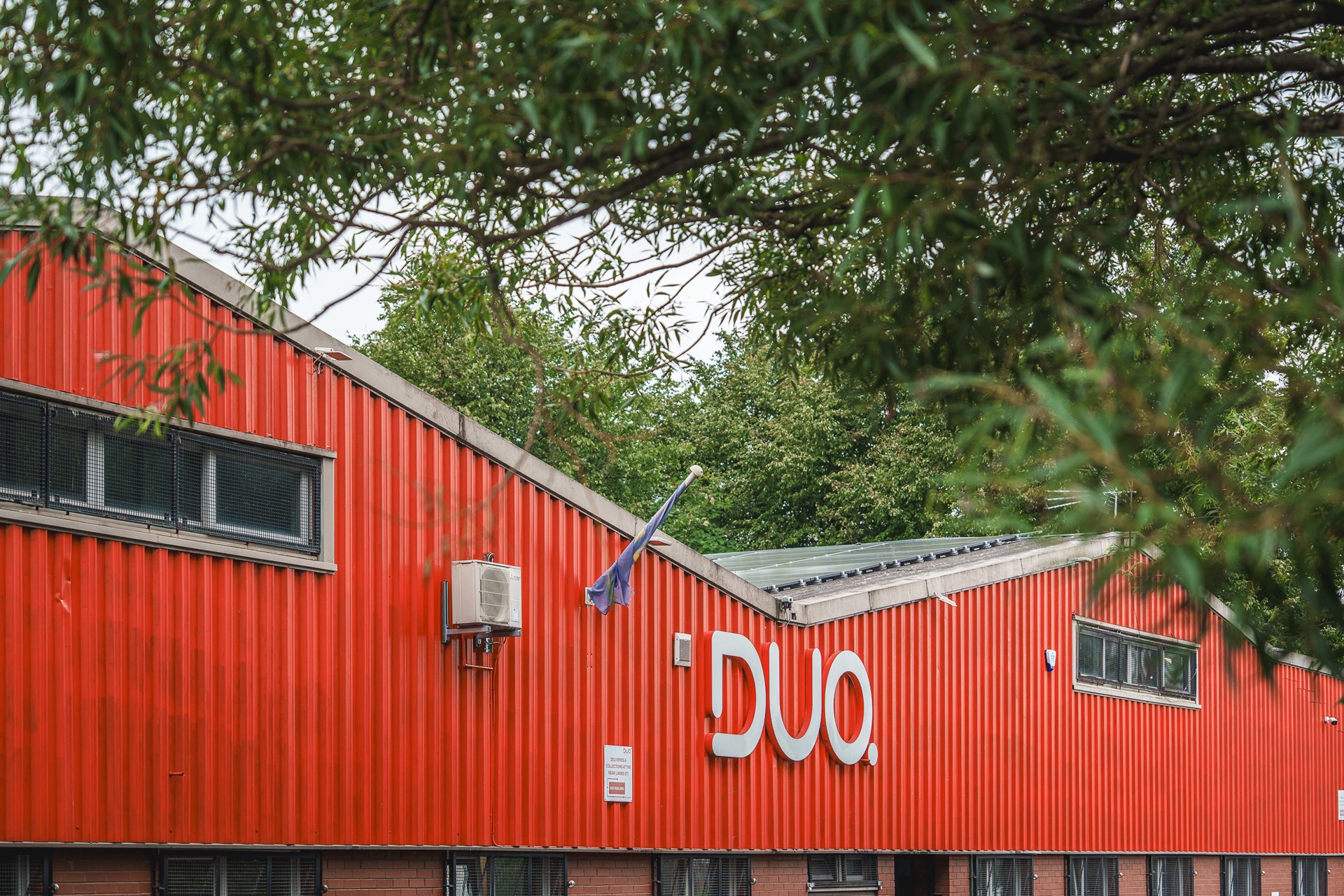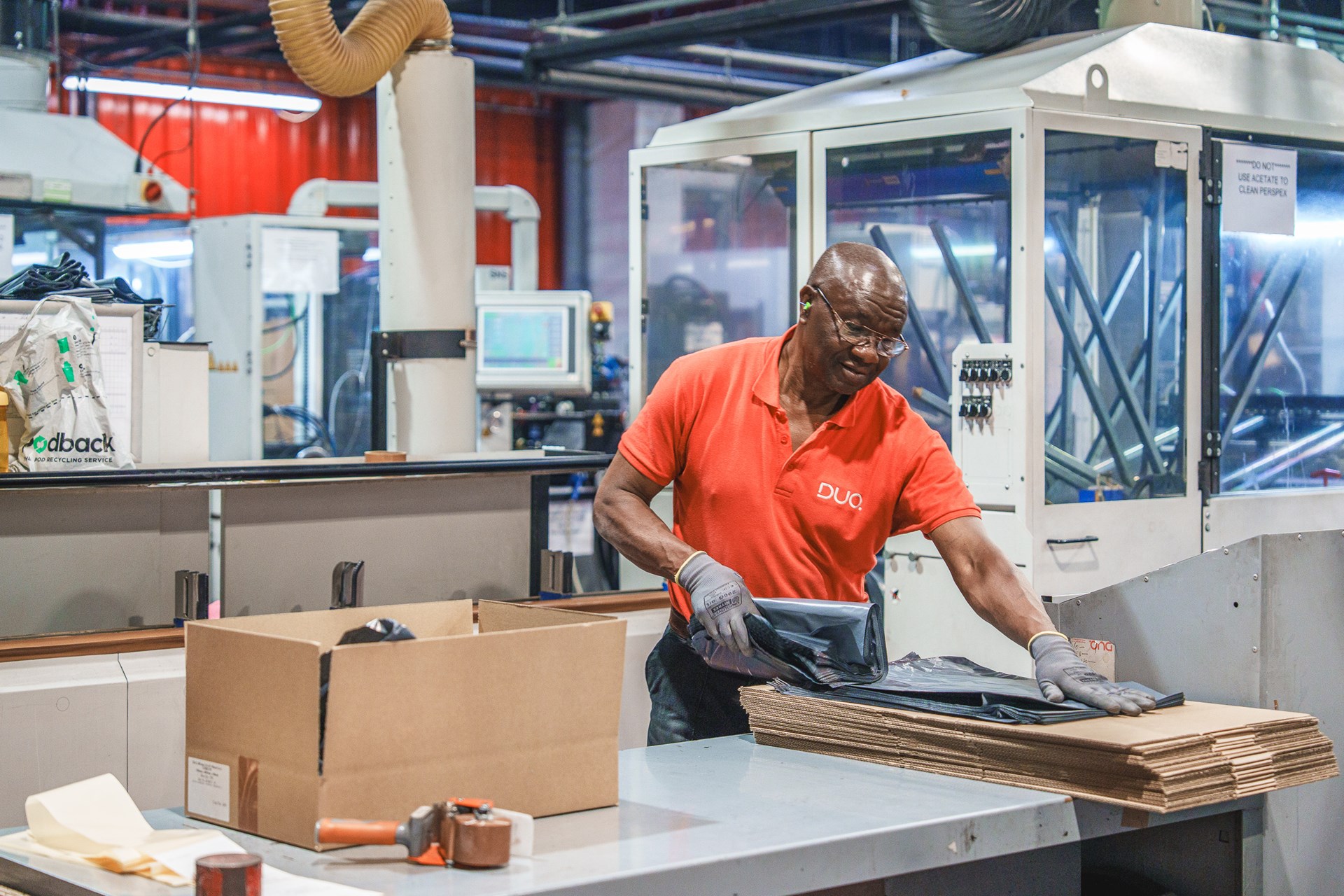Plastics manufacturer cuts carbon and navigates regulatory barriers
Read time:

Read time:

When thinking about sustainable businesses, a plastic packaging manufacturer may not be the first to come to mind. Manchester based Duo UK are committed to challenging that assumption, by successfully rolling out impactful environmental policies and strategies with the support of the Green Economy team.
We sat down with Zoe Brimelow, Brand Director at Duo, to gain insights about their sustainability journey and changing opinions about plastic packaging manufacturing.
The plastics industry has changed significantly in the past decade due to a shift in public opinion and new policy to reduce plastic use.
“The plastics tax was introduced in 2021, meaning certain plastic packaging item was required to have a minimum 30 per cent recycled content,” explains Zoe. “This didn’t impact us too much. We’ve always used recycled materials in our products, where possible because the quality can be very good, and it helps reduce the usage of virgin materials.”
Duo employs 102 people from its operation in East Manchester. They supply manufacturers, drinks and beverage industry, ecommerce and retail firms with plastic packaging products. Plastic remains an effective choice as it is hardwearing, lightweight and recyclable – whilst ensuring the integrity of products as they are transported. As a business, Duo have been innovative, providing increasingly sustainable solutions.
Generally, organisations use one of three main types of plastics:
“We were the first UK manufacturer to use GreenPE (bio-based plastics) to produce mailing bags,” says Zoe. “We are always on the lookout for new innovations in the industry, particularly those with evidenced sustainability credentials.”
“The UK plastic tax doesn’t currently account for bio-based plastic products. It focuses solely on recycled plastic content. This meant a lot of businesses within the industry who were using bio-based plastics switched to recycled materials instead, since the tax punished those whose plastic products contained less than 30 per cent recycled content. The risk is that products might include recycled plastic but when produced using bio-based GreenPE have a lower carbon footprint.”
Having been advocates of more sustainable plastics for years, the plastic tax increased demand for recycled plastic products in lieu of these green polyethene products.


The industry has a pressing issue around packaging design and how its product can be optimised for the most sustainable manufacture, use, recycling and end of life. Solutions include traceability of plastic materials through its entire value chain, Oceanix – recycled plastics from waste fishing equipment - and bio-based plastics.
“A lot of regulation has come in over the last few years”, says Zoe. “It has created extra levels of reporting and data, sometimes at the last minute, which places pressure on plastic packaging businesses. We’d like to see timely and defined changes, that are clearly communicated so companies can effectively anticipate new regulation and adapt accordingly. Plastic packaging organisations need more time and clarification. Complying to new legislation and levy’s takes time, people, investment and resources.”
The Green Economy team have been working with Duo, to support the businesses net zero ambitions.
“We recognised that while some of Duo’s machinery was quite energy-intensive, upgrading or replacing it wasn’t necessarily a cheap option,” explains Becky Chedd, Sustainability & Net Zero Consultant at Green Economy. “We helped Duo secure a grant which they could use to upgrade two of their shrink wrap machines, allowing for thinner plastics to be used which had the effect of reducing the amount of plastic wrap needed. Overall, Duo saved 25 tonnes of carbon with this switch, coming from a reduction in plastic use.”
Duo carried out the installation of a 44,000sq ft solar project comprised of 1,042 solar panels fitted on their Manchester factory in 2024. Having already committed to the project with a supplier, Becky reviewed their solar quote to check for accuracy before the project commenced, helping the business to save a further 128 carbon tonnes annually (tCO2e).
“It can feel like a leap of faith investing in technologies like solar, which we’re by no means experts in. Being able to corroborate our thinking with Becky and the Green Economy team provided reassurance that we were doing the right thing and quantified the CO2 savings.
As a business we’re committed to providing our customers more planet friendly choices, while furthering our own decarbonisation journey.”
Share